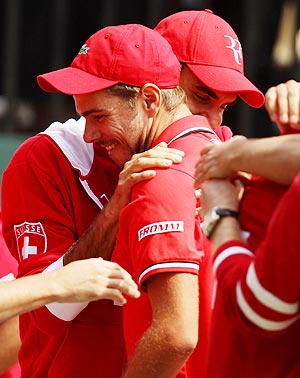Stanislas Wawrinka emerged from teammate Roger Federer's shadow to seal Switzerland's return to the Davis Cup World Group after finishing off Australia's Lleyton Hewitt in the deciding singles rubber of their playoff on Monday.
Wawrinka needed just one game to complete victory, breaking the former world number one's serve after bad light halted play on Sunday with the score stranded at 4-6, 6-4, 6-7, 6-4, 5-3.
 The World No 19 Swiss, who went down to Bernard Tomic in the opening rubber and had struggled on the grass courts at Sydney Golf Club, had also taken pain-killing injections for a foot injury before his fighting win over Hewitt.
The World No 19 Swiss, who went down to Bernard Tomic in the opening rubber and had struggled on the grass courts at Sydney Golf Club, had also taken pain-killing injections for a foot injury before his fighting win over Hewitt.
Wawrinka teamed up with Federer in a narrow loss in the doubles on Saturday and was delighted to play a decisive part in the 3-2 victory after his more illustrious team mate won both his singles rubbers against Hewitt and Tomic.
"It's amazing to be in the same team but for sure in Switzerland it is never easy because it doesn't matter what I am going to do or which ranking I am going to have because it's never going to be enough for Swiss people because they always look to Roger -- but that's okay," Wawrinka said.
Hewitt's loss condemned Australia, a former Davis Cup power with 28 titles, to their fourth straight defeat in the World Group playoffs and another year slugging it out in regional qualifiers.
It also capped an occasionally farcical tie that saw team captain Pat Rafter lose his cool a number of times with officials and later question the work ethic of Tomic, the country's brightest talent in the men's game.
The two-time US Open champion Rafter blasted the chair umpire over the use of a faulty net-cord sensor and berated him repeatedly for not calling time on the final singles rubber on Sunday as Hewitt and Wawrinka struggled to play the final set as light failed.
Eighteen-year-old Tomic, long considered an heir apparent to two-time Grand Slam champion Hewitt, confirmed his talent with a surprise quarter-final appearance at Wimbledon this year, but would not reach the top without working harder, Rafter said.
"If he wants to work hard he'll get the results, but he's got to start having consistent results every time he walks onto the court and putting everything out there," he added.
"That's been one of the weak parts of his game, that he's not applying himself day in, day out ... He can't expect to be a good player and not commit to any sport."













 © 2025
© 2025